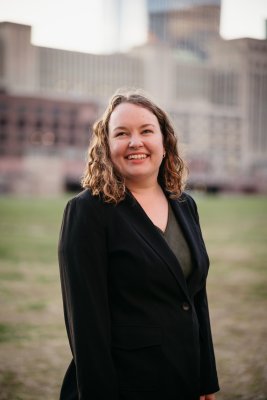Jenae Longenecker ’18

What is your current job and what have you been doing since graduation from GC?
After graduating from Goshen, I spent a year serving with the Moreau College Initiative, a college-in-prison program at Westville Correctional Facility. Through the program, Notre Dame and Holy Cross College faculty teach liberal arts courses to incarcerated students.
Next, I attended Notre Dame Law School where I served as an editor on the Law Review and as student president of the American Constitution Society. As a law student I interned with Legal Aid Chicago, the Chicago Alliance Against Sexual Exploitation, the Notre Dame Office of Institutional Equity, and the U.S. District Court for the Northern District of Indiana. In the spring and summer of 2022, I graduated, took the bar exam, and started a one-year position as a judicial clerk.
What does a typical day at your job look like? What would a typical day entail?
Judicial clerkships are a chance to learn from a judge about how courts operate, what effective advocacy looks like, and how to navigate many different areas of the law. Law clerks assist judges with writing, research, and the logistics of trials and oral arguments. Clerking is generally a short-term endeavor, like a postdoc in other fields. My current position is at the federal trial court in Chicago; next year, I’ll clerk for a judge on the Ninth Circuit Court of Appeals in Pasadena, CA.
The work is an incredible educational opportunity, and a big responsibility at the same time. Every day is a little different: sometimes I put together instructions to help a jury understand the law, other times I write drafts of judicial opinions resolving civil motions or research evidentiary issues.
How did studying History at GC prepare you for your career?
I loved studying history at Goshen. I took classes in so many different areas—from immigration history to African history to food history. The highlight for me was the junior and senior seminar series, where we learned about history as a discipline and spent months developing our own research agendas and writing senior theses. Overall, the program gave me countless opportunities to conduct research, develop habits of careful reading and concise writing, and synthesize complex ideas in my own words. These were essential tools for law school and continue to benefit me in my current work.
Just as importantly, my time at Goshen gave me an opportunity to grow into some of my strongest passions: care for survivors of gender-based violence and for those impacted by incarceration. These are the primary things that motivate me to pursue a legal career.
The last thing I’ll add: being involved in the humanities at Goshen meant connecting with incredible faculty mentors, whose guidance I continue to value greatly.
Do you have any advice for current History students?
If you’re a history student thinking about law school, remember that just like history, law intersects with every area of life. Whether it’s immigration, the environment, racial justice, business, healthcare, or, well, you name it—the law has something to say about it. Every lawyer chooses certain areas to focus on.
So develop your interests now. It can be hard to get your hands on law-related opportunities as an undergrad, but that shouldn’t stop you from building a resume that shows who you are and the kinds of things you value. If you want to be an immigration lawyer, for example, pursue opportunities related to immigrant rights, whether legal or not. If you start now, when it comes time to write your law school applications or apply to your first legal job, you’ll be able to show—not just say—what kind of career you want.
Also, there’s no need to go straight to law school. If that’s your plan, you should start thinking about the Law School Admissions Test (LSAT) in your junior (or even sophomore) year of college. But that doesn’t need to be your timeline. Law school is a big investment, and lawyering is a demanding career—so take your time deciding if it’s what you want.




